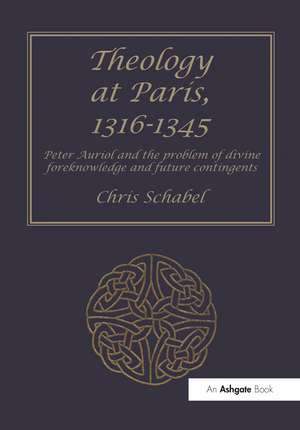Theology at Paris, 1316–1345: Peter Auriol and the Problem of Divine Foreknowledge and Future Contingents: Ashgate Studies in Medieval Philosophy
Autor Chris Schabelen Limba Engleză Hardback – 29 dec 2000
Preț: 938.95 lei
Preț vechi: 1031.81 lei
-9% Nou
Puncte Express: 1408
Preț estimativ în valută:
179.66€ • 187.60$ • 148.36£
179.66€ • 187.60$ • 148.36£
Carte disponibilă
Livrare economică 26 martie-09 aprilie
Livrare express 11-15 martie pentru 45.20 lei
Preluare comenzi: 021 569.72.76
Specificații
ISBN-13: 9780754602040
ISBN-10: 0754602044
Pagini: 382
Dimensiuni: 148 x 210 x 28 mm
Greutate: 0.87 kg
Ediția:1
Editura: Taylor & Francis
Colecția Routledge
Seria Ashgate Studies in Medieval Philosophy
Locul publicării:Oxford, United Kingdom
ISBN-10: 0754602044
Pagini: 382
Dimensiuni: 148 x 210 x 28 mm
Greutate: 0.87 kg
Ediția:1
Editura: Taylor & Francis
Colecția Routledge
Seria Ashgate Studies in Medieval Philosophy
Locul publicării:Oxford, United Kingdom
Cuprins
Contents: Introduction; The Background: The roots of the debate; The immediate context; Peter Auriol’s Theory: Immutability equals necessity; Indistant knowledge of the future; Neutral propositions; Intrinsic and extrinsic willing; The Reaction to Auriol’s Theory at Paris: Franciscans against the God of the philosophers; The reaction outside the Franciscan convent at Paris; The Marchist School; The Reaction in England and in the Late Middle Ages: London and Oxford 1317-1344; Paris 1343-1345; Auriol’s theory in the late Middle Ages; Epilogue: the quarrel at Louvain; Bibliography; Indexes.
Notă biografică
Chris Schabel, University of Cyprus
Recenzii
'The work is based on an impressive amount of firsthand manuscript evidence that carries the reader into previously unexplored territory with damaging the flow of the narrative. The conclusions are well argued and convincing. Given its scope and quality, the book will become the standard on this topic.' Journal of Ecclesiastical History '...there can be no doubting that Schabel's study of Paris fourteenth-century theology has made a major contribution towards our understanding of the complexities and changing patterns of fourteenth-century intellectual practice. This volume, together with Schabel's committed editorial work, is certainly at the forefront of recent works which attempt to portray the fourteenth century as a period of renewal, rather than decline, of the scholastic enterprise.' English Historical Review 'The problem of God's knowledge of future contingents has long been one of the more intractable issues in philosophical theology. This fascinating study provides a snapshot of one of the more interesting periods for discussion of the issue: the first half of the fourteenth century... Schabel has written a stimulating book that unearths a vast amount of interesting and important material.' Journal of Theological Studies 'Chris Schabel...has diligently researched archives and has edited some of Auriol's writings...(he) shows that Auriol is a pivotal figure in the history of the problem and in the history of theology at the University of Paris.' Theology Digest 'For scholars interested in the history of divine conscience in the late-medieval period, these chapters are essential reading and provide an important glimpse into the many positions resulting from Auriol's provocative theory. With this volume Auriol has regained his position in the history of medieval discussions of God, omniscience, and temporality.' Speculum '... an important contribution to the literature not least because it takes the account beyon Peter.' Theological Studies
Descriere
Chris Schabel presents a detailed analysis of the radical solution given by the Franciscan Peter Auriol to the problem of reconciling divine foreknowledge with the contingency of the future, and of contemporary reactions to it. Auriol's solution appeared to many of his contemporaries to deny God's knowledge of the future altogether, and so it provoked intense and long-lasting controversy; Schabel is the first to examine in detail the philosophical and theological background to Auriol's discussion, and to provide a full analysis of Auriol's own writings on the question and the immediate reactions to them. This book sheds new light both on one of the central philosophical debates of the Middle Ages, and on theology and philosophy at the University of Paris in the first half of the 14th century, a period of Parisian intellectual life which has been largely neglected until now.





